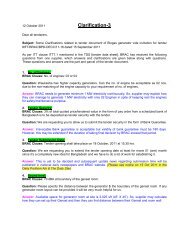Combining health and social protection measures to reach the ultra ...
Combining health and social protection measures to reach the ultra ...
Combining health and social protection measures to reach the ultra ...
- No tags were found...
Create successful ePaper yourself
Turn your PDF publications into a flip-book with our unique Google optimized e-Paper software.
Research resourcesChanging environmentGlobal <strong>health</strong> policyenvironmentEmphasis ondevelopment of <strong>to</strong>ols<strong>and</strong> interventions forhigh-burden diseasesEmerging public <strong>health</strong>problems <strong>and</strong> recentresearch developmentsBrain drain,globalizationO<strong>the</strong>rs (cross-cutting)Examples of RSC needs✜ Health policy <strong>and</strong> systems research✜ Knowledge management systems✜ Surveillance <strong>and</strong> information managementsystems✜ Product discovery <strong>and</strong> development✜ Clinical <strong>and</strong> field trial design <strong>and</strong> methodology✜ Economic analyses✜ Surveillance <strong>and</strong> global alert systems✜ Research training on priority <strong>health</strong> problemsidentified by countries/regions✜ Equity research✜ Health policy <strong>and</strong> systems research✜ Interdisciplinary research✜ Centres of excellence <strong>and</strong>/or virtual centers ofexcellence✜ Research financing <strong>and</strong> incentive systems✜ Knowledge of regula<strong>to</strong>ry issues <strong>and</strong>intellectual property rights✜ Leadership <strong>and</strong> management: e.g., prioritysetting, strategic planning, partnershipdevelopment, community involvement,moni<strong>to</strong>ring <strong>and</strong> evaluation✜ ICT: equipment, access <strong>and</strong> know-how✜ Research ethics✜ Research syn<strong>the</strong>sis✜ Knowledge translationTable 1: Specific RCS needs related <strong>to</strong> recent global <strong>health</strong>developmentspublications 17, 21, 33 as well as in <strong>the</strong> annual fora of <strong>the</strong> GlobalForum for Health Research. Broadly speaking, <strong>the</strong>se relate <strong>to</strong>training <strong>and</strong> retention of human resources, <strong>the</strong> researchenvironment, translation of evidence <strong>to</strong> policy <strong>and</strong> practice,<strong>and</strong> <strong>the</strong> management of <strong>the</strong> <strong>health</strong> research system. Inrelation <strong>to</strong> recent trends in <strong>the</strong> global <strong>health</strong> l<strong>and</strong>scape, Table1 outlines some specific RCS needs <strong>to</strong> be able <strong>to</strong> respond <strong>to</strong><strong>the</strong>se developments, ranging from training in strategic <strong>and</strong>implementation research <strong>to</strong> leadership <strong>and</strong> managementskills. The needs have been so overwhelming that <strong>the</strong>research response has tended <strong>to</strong> be diffuse <strong>and</strong> patchy. Thetipping point for RCS is unlikely <strong>to</strong> be <strong>reach</strong>ed without aconsolidated strategy. This very much depends on <strong>the</strong>responsiveness of <strong>the</strong> <strong>health</strong> research systems in LMICs.A number of countries have begun <strong>the</strong> process of reengineering<strong>the</strong>ir <strong>health</strong> research systems. And yet, in spite of<strong>the</strong> clear evidence on <strong>the</strong> link of <strong>health</strong> research <strong>to</strong>development, streng<strong>the</strong>ning of <strong>the</strong> NHRS has failed <strong>to</strong> figurestrongly in national development plans <strong>and</strong> support fromoverseas development agencies. While <strong>the</strong> need for <strong>health</strong>systems research has been articulated strongly in connectionwith <strong>the</strong> MDGs, <strong>the</strong> very system that underpins <strong>the</strong>generation of sustainable research resources has failed <strong>to</strong>garner <strong>the</strong> same attention. The debates on RCS for basic vs.applied research, <strong>health</strong> systems research vs. innovation,SARS/AI/HIV/TB/malaria vs. non communicable diseases areall symp<strong>to</strong>matic of <strong>the</strong> “silo syndrome” in <strong>health</strong> research,aggravated by <strong>the</strong> “Willy Sut<strong>to</strong>n Law” 34 .Reference has been made <strong>to</strong> <strong>the</strong> UNAIDS “three ones”principle of “one action framework, one coordinating authority<strong>and</strong> one moni<strong>to</strong>ring <strong>and</strong> evaluation system” as a model foreffective RCS at <strong>the</strong> national level 21 . More specifically, aunified framework <strong>and</strong> strategy for <strong>health</strong> research fornational development, in response <strong>to</strong> <strong>the</strong> changing l<strong>and</strong>scapeat <strong>the</strong> national, regional <strong>and</strong> global levels, needs <strong>to</strong> be carvedout, advocated <strong>and</strong> vigorously implemented by each country.At <strong>the</strong> global level, recent moves <strong>to</strong> consolidate <strong>and</strong>innovate on RCS efforts <strong>to</strong> streng<strong>the</strong>n NHRSs areencouraging. However, if this collaborative enterprise is <strong>to</strong>have a significant impact on <strong>health</strong> research systems fordevelopment, it is equally essential <strong>to</strong> have wide, deep <strong>and</strong>long-term political <strong>and</strong> financial commitments from national<strong>and</strong> international stakeholders <strong>to</strong>wards a common vision <strong>and</strong>strategic plan for “research for development”. ❏Mary Ann D Lansang is Professor of Medicine <strong>and</strong> ClinicalEpidemiology at <strong>the</strong> College of Medicine, University of <strong>the</strong>Philippines, Manila, <strong>the</strong> Philippines. She is currently engaged in aUSAID-funded Health Policy Development Programme in <strong>the</strong>Philippines.Dr Lansang serves on <strong>the</strong> Board of ICDDR,B, <strong>the</strong> WHO’sImmunization Strategic Advisory Group of Experts, <strong>and</strong> <strong>the</strong> Councilof Advisers of <strong>the</strong> Philippine Society of Infectious Diseases <strong>and</strong>Microbiology. She is <strong>the</strong> immediate past Executive Direc<strong>to</strong>r of <strong>the</strong>INCLEN Trust (International Clinical Epidemiology Network)(2000–2004). Her research <strong>and</strong> training activities cover infectiousdiseases, clinical epidemiology, <strong>health</strong> policy <strong>and</strong> <strong>the</strong> ethics of<strong>health</strong> research.Rodolfo J Dennis is Professor of Medicine <strong>and</strong> ClinicalEpidemiology at <strong>the</strong> Pontificia Universidad Javeriana, as well asDirec<strong>to</strong>r of Medicine <strong>and</strong> Head of <strong>the</strong> Research Department atFundación Cardio-Infantil, both in Bogotá, Colombia. In addition <strong>to</strong>his clinical specialty in internal medicine <strong>and</strong> lung diseases, DrDennis has an MSc in Clinical Epidemiology from <strong>the</strong> University ofPennsylvania in <strong>the</strong> USA <strong>and</strong> is a PhD c<strong>and</strong>idate in Epidemiology<strong>and</strong> Biostatistics from <strong>the</strong> McGill University in Canada. ProfessorDennis currently sits on <strong>the</strong> Advisory Board of <strong>the</strong> Health Science<strong>and</strong> Technology Program of Colciencias, <strong>the</strong> major funding <strong>and</strong>research capacity building body of Colombia.126 ✜ Global Forum Update on Research for Health Volume 4



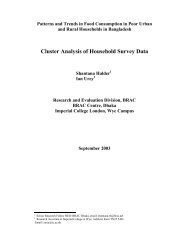
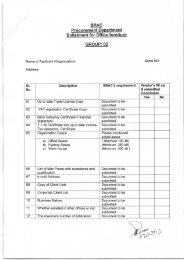
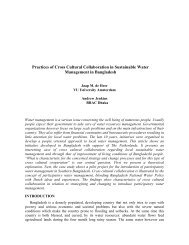
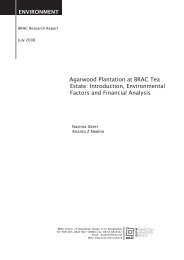
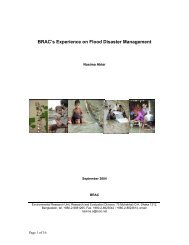
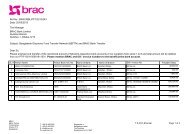
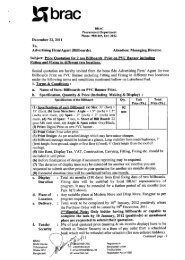
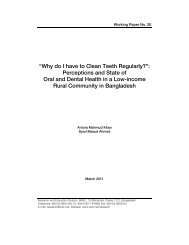
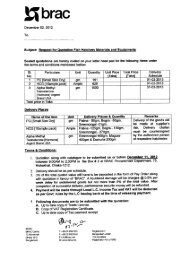

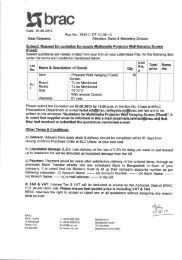
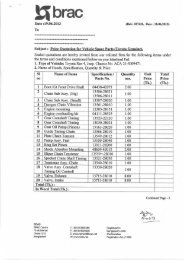
![[re-tender] RFQ for supply of Diesel Generator - Brac](https://img.yumpu.com/44421374/1/186x260/re-tender-rfq-for-supply-of-diesel-generator-brac.jpg?quality=85)
